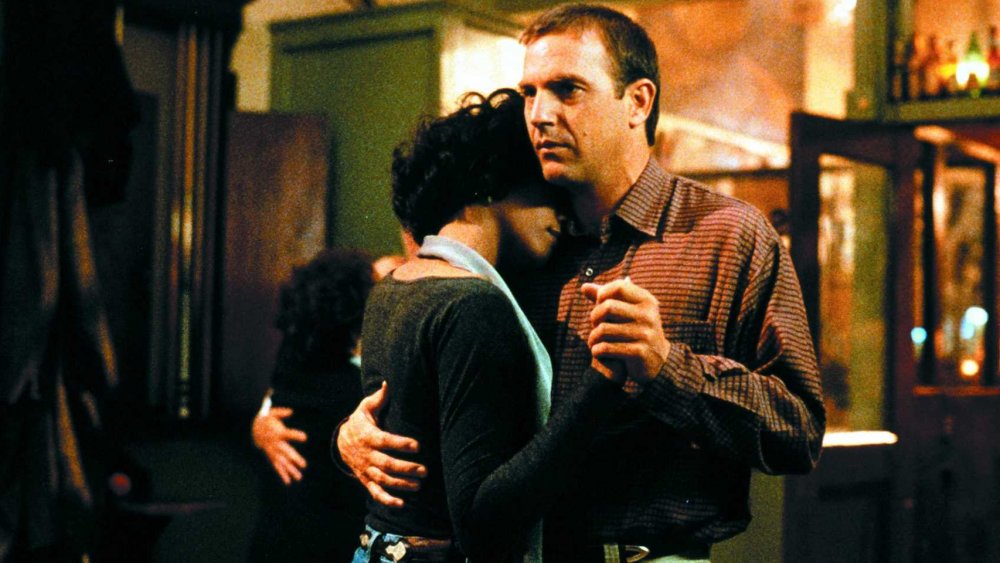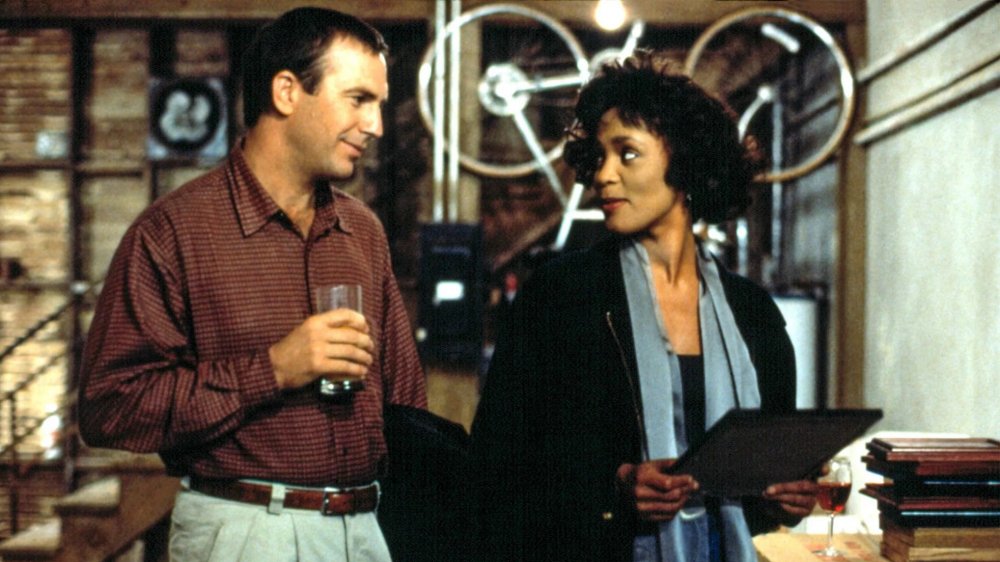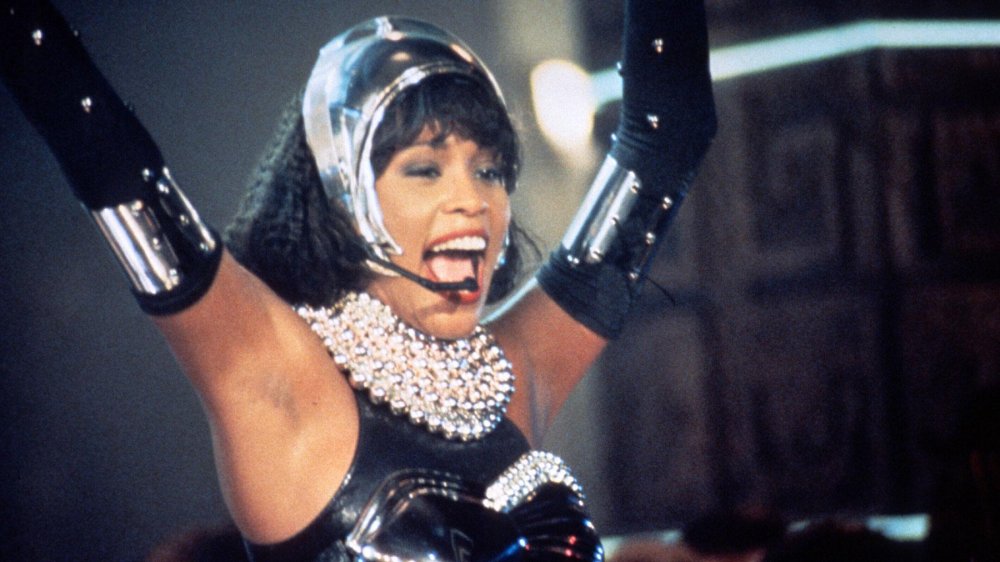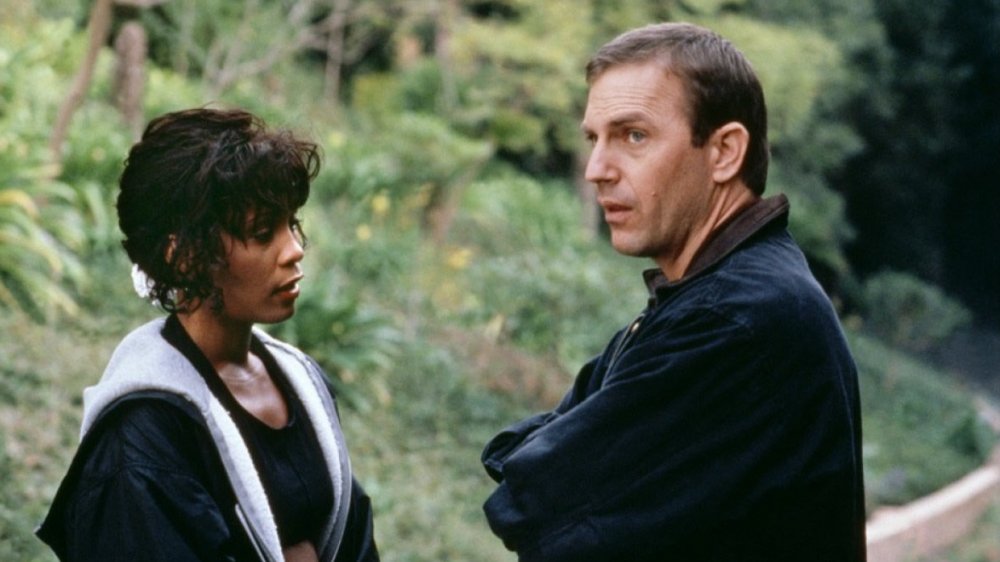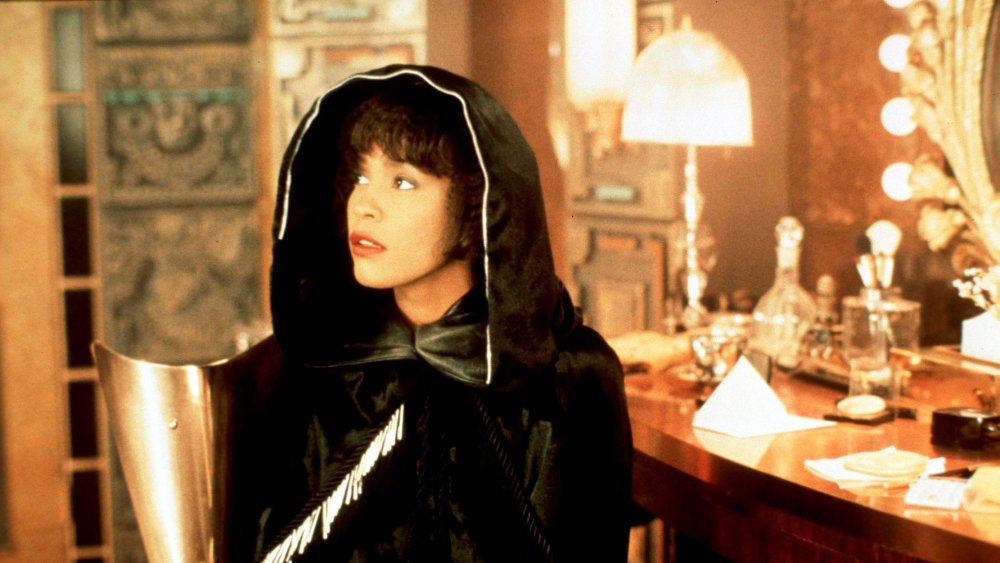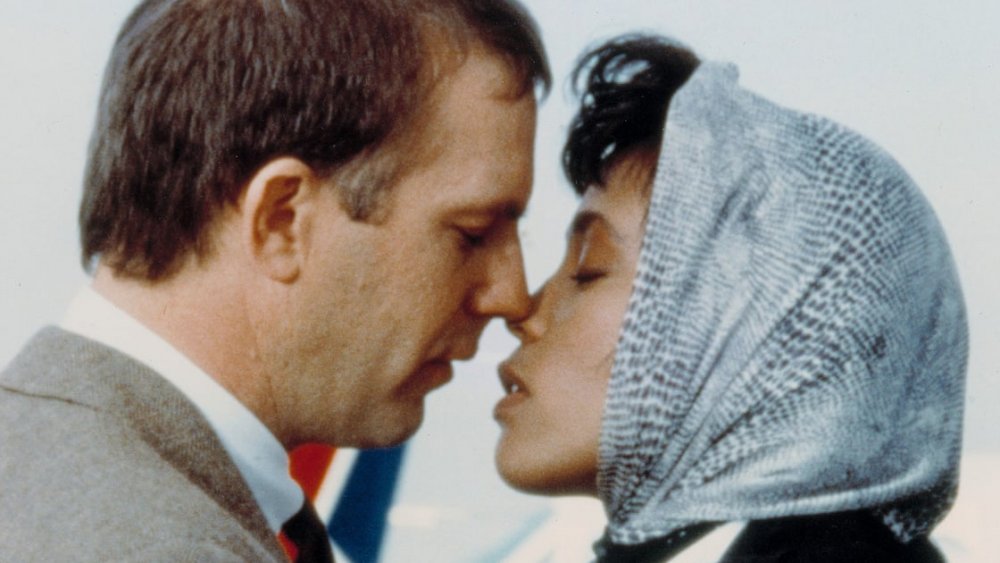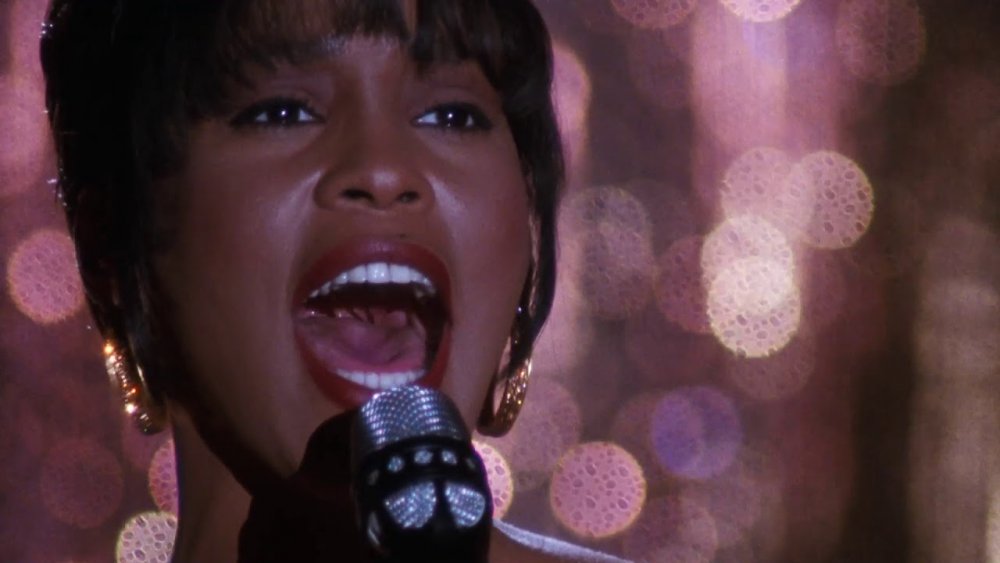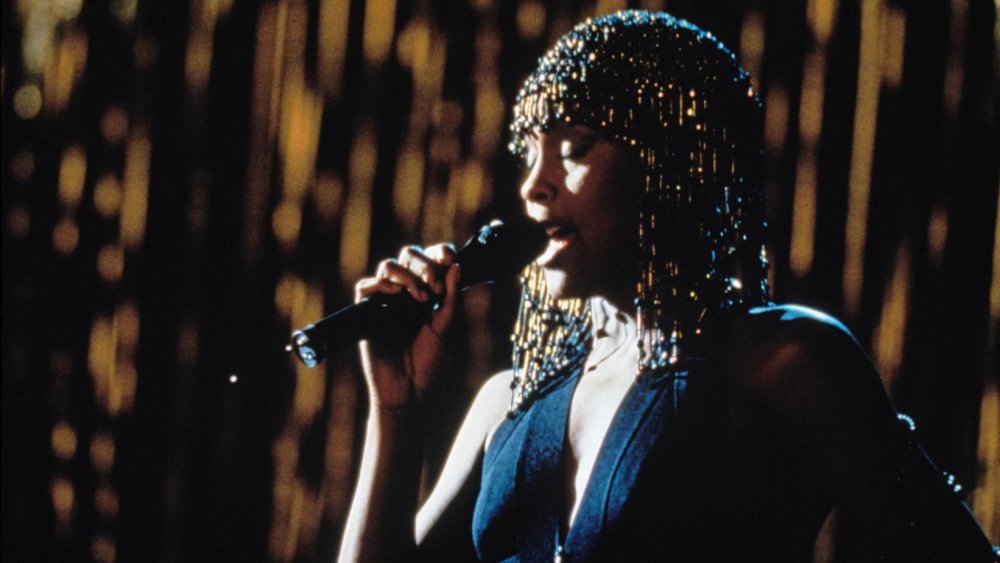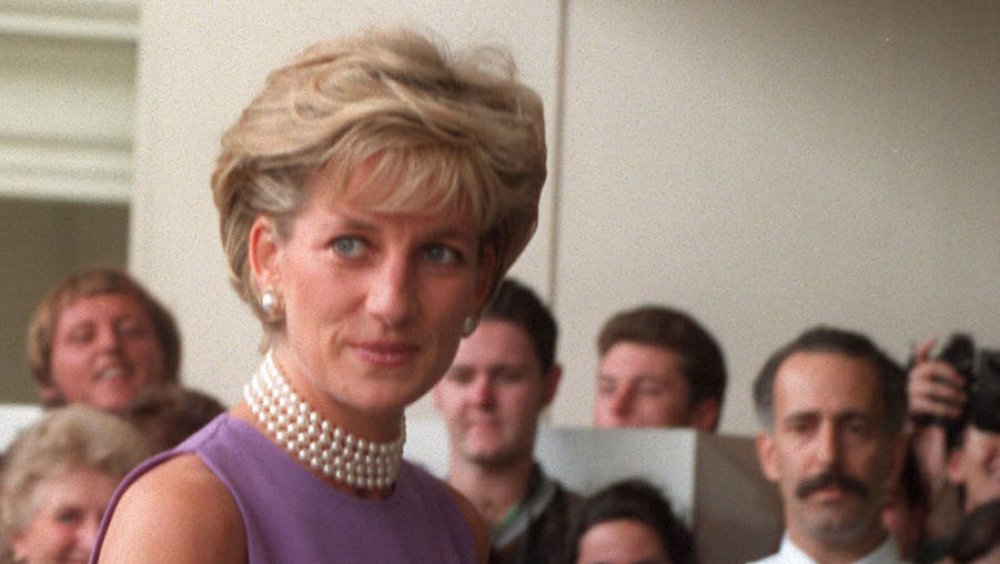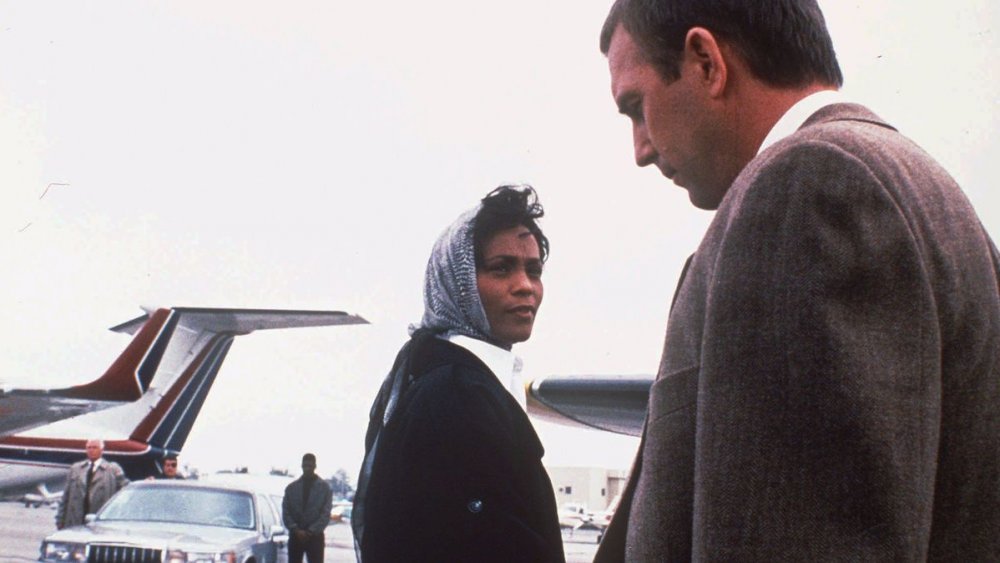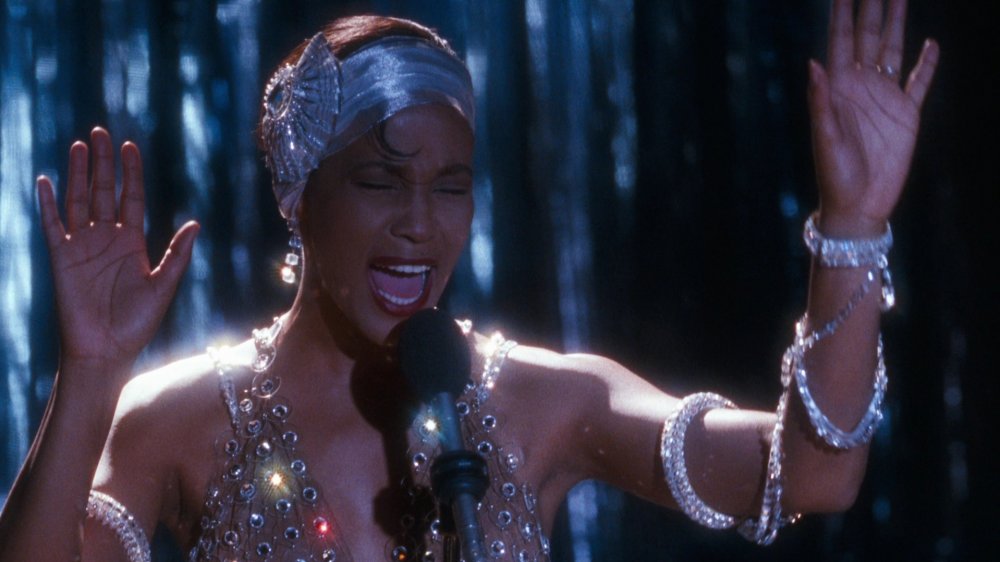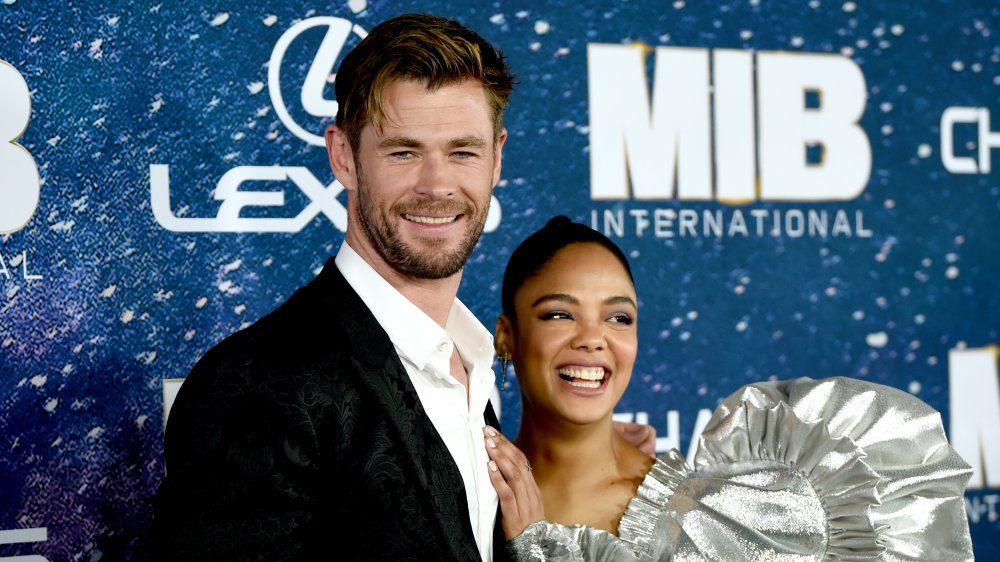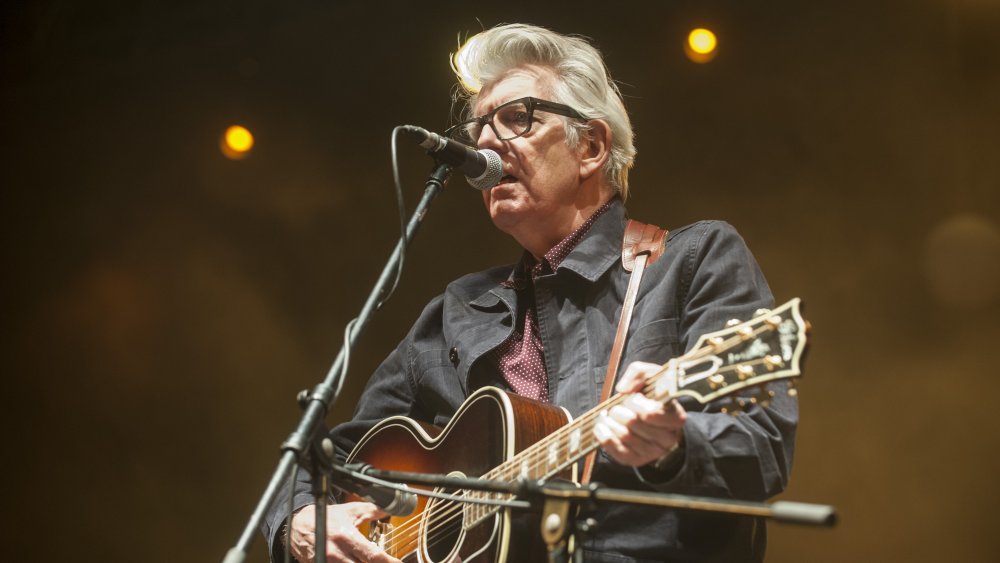The Untold Truth Of The Bodyguard
The year 1992 brought us President Bill Clinton, the Mall of America, Cartoon Network, and a movie about a stone-faced bodyguard who reluctantly signs up to protect a superstar with diva tendencies from whoever is sending her threatening letters.
Kevin Costner was the titular lead in The Bodyguard onscreen, and the production's enforcer behind the scenes. Costner had a vision for a script that had been wallowing in development purgatory for nearly 20 years — and he enlisted a pop star who was on the brink of losing some of her luster to help it sparkle.
The Bodyguard turned Whitney Houston from multiplatinum pop star to Grammy-winning global superstar, and earned nearly $122 million at the US box office. Although the movie was ridiculed by critics, audiences loved the combination of action thriller and forbidden romance, set in a Hollywood mansion and a snowy cabin, all culminating in an Oscar ceremony that was even more dramatic than that time La La Land didn't win Best Picture. The chemistry between Houston and Costner was so palpable that the pair became forever entwined in the public eye, to the point that Houston's family asked him to speak at her funeral after her death in 2012.
Here's how Costner and his cast and crew transformed The Bodyguard into a surprise hit, how he convinced Houston to become his leading lady, and how the movie changed some people's lives in unexpected ways.
It took 17 years to get The Bodyguard from script to screen
The Bodyguard was ushered into theaters on November 25, 1992. But writer Lawrence Kasdan wrote the first of many drafts some time around 1975, with Diana Ross and Steve McQueen in mind as the leads. At the time, Kasdan was a copywriter hoping to make his way into the movie industry. The script finally landed him an agent, but was rejected 67 times before being accepted and then forgotten about.
While it was on the shelf, McQueen was replaced by Ryan O'Neal, whom Ross was dating at the time. But Ross turned down the project — much to fading star O'Neal's anger. The Bodyguard was again left to gather dust, until a then-little-known actor named Kevin Costner read the script.
According to Kasdan, Costner loved the story right away. Although there wasn't much he could do with it at first, a couple of years later he became Kevin Costner: bona fide movie star, thanks to Dances with Wolves and a slew of other late '80s/early'90s blockbusters. Costner used some of his newfound Hollywood power to push The Bodyguard into production. Normally a script that had been hanging around in development limbo for nearly two decades would be doomed to remain words on a page, but Costner's determination and vision brought The Bodyguard to life.
Kevin Costner was set on having Whitney Houston as the lead
In the late '80s, Whitney Houston was as famous in pop music as Costner was in movies: that is, she was one of the most popular singers in the country. In 1985, her self-titled debut album topped the Billboard 200, and she became the first female performer to have three number one Billboard Hot 100 singles from one album. Her 1987 follow-up Whitney also went multi-platinum.
Costner admitted that he was initially drawn to Houston for superficial reasons. "I saw her like every red-blooded male would see her: I thought she was really pretty," he told CBS. But he quickly became convinced that no one else could play Rachel, to the point that he was willing to wait a year for Houston to accept the role. "I just thought she was that right," Costner added.
Kasdan agreed: he'd always seen Rachel as a superstar singer — hence Diana Ross as his first choice in the '70s. But by the '90s, Houston's early success had plateaued, and it was harder to convince some executives to cast her over an established screen star. Costner stood his ground. He told Yahoo, "It's like faking being a good baseball player. When you see one of our world-class actresses faking being a good singer, it doesn't seem right." Clearly, he won the argument.
Whitney Houston didn't want to star in The Bodyguard
Costner had his sights firmly set on having Whitney Houston lead The Bodyguard as Rachel Marron, but first he had to convince her to take the part. By then Houston was a successful pop star, and she had considered acting. But as she explained to Rolling Stone in 1993, her plan was to start out with small roles and slowly progress. In her words, "I never thought I'd be co-starring with Kevin Costner!" Moving into acting forced Houston out of her comfort zone. And having achieved a certain level of fame already, she was well aware of the scrutiny and schadenfreude that comes with being in the spotlight. She worried — not without cause — that "people would dog me before they gave me the opportunity to do the job."
After reading the script, Houston was still unsure, describing Rachel in the initial drafts as "very rough, very hard." She delayed accepting the part until Costner called her himself. When he promised that he wouldn't let her make a fool of herself, she agreed to do it — but he also told her not to get acting lessons. "He said: 'I promise you I will not let you fall. I will help you,'" she recalled. "And he did."
Some people fixated on the fact Houston was black
Despite Costner's absolute faith that Houston was the right woman for the role of Rachel, some people behind the scenes took issue with one particular aspect of her casting. As Costner drily phrased it in a 2014 interview with Yahoo, "Everybody alerted me to the fact that she was black, which I knew."
It wasn't only that Houston was black. The film centered on an interracial romance between a black woman and a white man, a concept that was considered controversial by certain people in 1992. Houston and writer Lawrence Kasdan both insisted that the characters' ethnicities weren't relevant. As Houston told Rolling Stone in 1993, "Nobody [in the audience] made an issue of that... They weren't looking at a black person and a white person, they were looking at two people having a relationship." In an interview for the DVD, Kasdan — who, remember, wrote the script for Diana Ross and Steve McQueen — said Rachel's race didn't matter: "She was just a big star: her race was star."
During the movie's production, Costner refused to pander to those who worried that the pairing would cause a scandal. He flatly refused requests to add a scene "that explains the black and white thing," as he sardonically phrased it in a DVD interview. "Absolutely not."
Several love scenes were cut from The Bodyguard
Although The Bodyguard has one of the most famous kisses in movie history — and one of the most famous love songs — the romantic scenes are actually pretty tame. There's that farewell kiss on the runway, and the kiss after Costner's character Frank cuts Rachel's silk scarf in half with his samurai sword. (Don't try that at home.) The sex that presumably follows happens offscreen.
Part of the reason for the chaste representation was Houston's refusal to appear nude. She told Vanity Fair in 1992, "they aren't going to tell me to take my clothes off. I'm not hired to show my ass. I don't think it's my greatest asset." (Better to set boundaries than end up shooting one of many love scenes actors regret filming.)
Costner and Houston filmed more love scenes, but they were cut from the final edit. One surfaced later, showing Frank undressing Rachel after carrying her out of the club. But they weren't left out for being too racy: In a clip posted by Entertainment Tonight, Houston told an interviewer that when it came to deciding whether to leave these love scenes in or take them out, "I would have been fine either way, because the ones that were cut were also tasteful."
Houston nearly didn't sing 'I Will Always Love You'
Whitney Houston performed six songs for The Bodyguard's record-breaking soundtrack, but the breakout number was undoubtedly her cover of Dolly Parton's "I Will Always Love You." It's now a staple of karaoke, talent shows, and breakups, but the song almost didn't make it into the film.
Originally, Houston was going to sing "What Becomes of the Brokenhearted," but while The Bodyguard was still in production, Paul Young entered the Billboard charts with a cover recorded for Fried Green Tomatoes. With Costner and song producer David Foster scrambling for a replacement, music supervisor Maureen Crowe suggested Linda Ronstadt's version of Parton's 1974 country ballad.
Costner and Foster immediately knew it was perfect. Houston hadn't been keen on "Brokenhearted," but Foster told ABC "her face lit up" when she heard his arrangement of "I Will Always Love You." The male lead and the music man had one creative disagreement: Costner insisted on the a cappella opening, which Foster initially balked at but later admitted was the right call. As for Parton, she recalled that she first heard Houston's cover of her song while she was driving, and she was as blown away as everyone else. "I just about wrecked the car," she told an interviewer in 2011. After Houston's death in 2012, Parton released a statement eulogizing the singer and praising her "wonderful performance" of the song.
That isn't Whitney Houston on the poster
The Bodyguard's poster proves that a picture really can be more valuable than a thousand words (particularly when those thousand words are written by a not-very-kind critic.) It shows Kevin Costner's bodyguard carrying Whitney Houston's Rachel out of a club where the singer has been mobbed by a too-enthusiastic crowd. It's especially memorable for incorporating Houston's most iconic outfit in a movie of iconic outfits: the black bobbed wig, metallic breastplate and thigh-high leather boots. Add in rain and greyscale, and it's peak '90s movie marketing.
At the time, however, the poster managed to cause controversy. Some thought the studio deliberately hid Houston's face in an effort to downplay the interracial romance at the center of the film. Houston dismissed this, telling Rolling Stone in 1993, "I mean, people know who Whitney Houston is — I'm black. You can't hide that fact."
According to Costner, the studio actually wanted more of Houston showing, since she was supposed to be a big draw. He said that the shot where her head is buried in his shoulder was his idea. "I picked that picture out because my friend Ben Glass took it... it was so evocative," he told Entertainment Weekly. He also spilled another secret: "That wasn't even Whitney, actually. She had gone home and that was her double."
A sequel was being written for a real-life megastar
We nearly got to find out what happened after Frank and Rachel parted ways at the end of The Bodyguard — and it could have involved someone even more famous than Whitney Houston. In 2012, Costner revealed to Anderson Cooper that he was trying to convince Princess Diana to sign up for a specially written role in a sequel to The Bodyguard. The plot would have been pretty similar to the first movie: Frank is reassigned to protect the princess's character from stalkers and paparazzi, and they end up falling in love.
Costner went into more detail about his conversations with Princess Diana in 2019, telling People she was, "incredibly sweet on the phone," but that she was concerned about doing kissing scenes because, as Costner put it, "her life was very governed." As with Houston, he tried to work his charms, persuading her that they'd figure that part out and he would watch out for her.
Sadly, the safety problems the movie intended to address were all too real for Diana. Costner received the script for the project the day before the princess was killed by a high-speed car crash pursued by paparazzi on August 31, 1997 in Paris. Diana's boyfriend Dodi Fayed and driver Henri Paul also died, while her real bodyguard, Trevor Rees-Jones, sustained serious injuries but survived.
There were serious accidents on set
Rachel Marron made it through her encounter with stalkers and assassins unscathed (unlike the character's treacherous sister), but the crew dealt with very real danger behind the scenes. For Frank and Rachel's goodbye kiss, the camera was set up to run on a dolly rail that followed Houston as she ran towards Costner, then circled the pair as they kissed. In the first take, the camera operator was thrown from the platform, but the camera continued rolling — in both senses of the word. Fortunately the operator wasn't seriously hurt, and managed to catch up to the camera and finish the shot. In an interview for the DVD, director Mick Jackson said he used that first take in the movie — spare a thought for the camera operator next time you watch.
Another accident on set did not have a happy ending. On January 3, 1992, grip truck driver William Vitagliano was crushed between two lighting equipment cranes that crashed into each other, and died shortly after being rushed to the hospital. Warner Bros. investigated the accident, and a lawsuit filed against the equipment manufacturers was settled for an undisclosed amount in 1994.
Whitney Houston contributed more than her voice to the soundtrack
Having hit the high notes when it came to box office takings, The Bodyguard made the leap to CD players: it's the best-selling soundtrack of all time, with over 18 million copies sold in the US alone. And Houston contributed much more than her incredible voice. Not only did she sing six songs, but she was also an executive producer who wrangled collaborators and defined the movie's sound.
Houston asked music mogul L.A. Reid and singer Kenneth Edmonds, a.k.a. Babyface, to write "Queen of the Night," and ended up helping them finish the song. She asked gospel producer and friend BeBe Winans to create a longer version of "Jesus Loves Me" for the soundtrack — and made sure Warner Bros. included it. She also chose to cover Chaka Khan's "I'm Every Woman," which doesn't appear in the movie but became the album's second top-five single.
Houston's and her collaborators' musical intuitions paid off. After she was nominated for Grammy Awards for her two previous albums, The Bodyguard earned Houston the Grammy for 1993's Album of the Year, Record of the Year, and Best Female Vocal Pop Performance for "I Will Always Love You." On a personal note, Houston saw her work on the album as the starting point of a more mature stage in her career. Having been a teenager when she started making music, she told Out magazine, "From 'I Will Always Love You' on, that's a woman."
Warner Bros. considered a remake — and this duo is up for it
If you've been paying attention to the endless reboots and remakes hitting screens big and small, it will come as no surprise that Warner Bros. has never taken a remake of The Bodyguard off the table. The rumors gathered further momentum in 2011, when Jeremiah Friedman and Nick Palmer were assigned to write a script. There was so much discussion at the time that Rihanna addressed speculation that she was in the running to play Rachel, saying that playing a singer would be too easy. (She made her feature debut in 2012's critically slammed Battleship instead.)
Friedman and Palmer's version seems to have petered out (unless it's turning into another one of those movie sequels that took decades to get off the ground.) But discussion of a remake bounded back into the press recently, thanks to a famous duo. Tessa Thompson and Chris Hemsworth have already teamed up for Thor: Ragnarok, Avengers: Endgame, and Men in Black: International, and they're ready and willing to put their excellent chemistry to use in The Bodyguard 2.0. Thompson kicked off the idea after Hemsworth revealed how much he loved the original. They're both pretty busy with Thor right now, but while we wait for that Frank and Rachel reunion, Taika Waititi's newest Thor: Love and Thunder teases will have you hyped for more of this pairing.
The Bodyguard soundtrack made this singer a millionaire
When The Bodyguard soundtrack won Album of the Year at the 1993 Grammys, the award went to Whitney Houston, who performed six songs and served as the album's executive producer, alongside Clive Davis. But the soundtrack's success changed the life of a lesser-known musician who had no direct input into the film.
Nick Lowe is the British songwriter and performer who wrote the song "What's So Funny 'Bout Peace, Love and Understanding" in 1974 for his band Brinsley Schwartz. The song was not a hit for them, but it became an anthem when Lowe's friend Elvis Costello covered it on his 1979 album Armed Forces. Lowe went on to work as a producer, and also played in other bands and on his own. He was famous in Britain's punk and New Wave scenes, working on the Damned's "New Rose" — considered the first British punk song. His biggest US hit was "Cruel to be Kind," which peaked at number 12 in 1979. He was also married to Carlene Carter (daughter of June Carter and Carl Smith, stepdaughter of Johnny Cash) from 1979 to 1990.
Lowe's long career didn't set him up financially, and by the early '90s he was struggling. But after Curtis Stigers covered "Peace, Love and Understanding" for The Bodyguard soundtrack, the royalty checks started pouring in. AOL.com estimated that Lowe earned $2.52 million over 20 years, allowing him to work on creatively satisfying projects without worrying about his bank balance.
